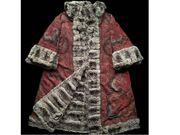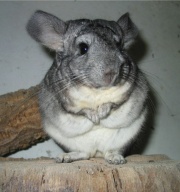Difference between revisions of "Chinchilla"
Jump to navigation
Jump to search
| Line 28: | Line 28: | ||
* Edward Reich, Carlton J. Siegler, ''Consumer Goods: How to Know and Use Them'', American Book Company, New York City, 1937 | * Edward Reich, Carlton J. Siegler, ''Consumer Goods: How to Know and Use Them'', American Book Company, New York City, 1937 | ||
| − | * Wikipedia | + | * Wikipedia: http://en.wikipedia.org/wiki/Chinchilla (Accessed Oct. 18, 2005) |
[[Category:Materials database]] | [[Category:Materials database]] | ||
Latest revision as of 15:01, 22 October 2022
Description
Valuable, fine-textured fur obtained from a small South American rodent of the family Chinchillidae (order Rodentia). The short, dense chinchilla fur is usually pale gray with darker slate blue shading. Guard hairs are white with dark tips. Chinchillas are very rare in the wild after being hunted to near extinction. International trade of chinchilla fur began in the 1500s and by the end of the 19th century, the animals were rare. All current commercial fur production is from animals raised in captivity.
Synonyms and Related Terms
Chinchilla lanigera; chinchilla (pels) (Dan., Esp., Fr., Ned.); Eigentlichen Chinchillas (Deut.); chincilla (Port.); mantelgoed (zware wollen mantelstof) (Ned);
Physical and Chemical Properties
Fur density is greater than 20,000 hairs per square cm.
Additional Images
Resources and Citations
- Encyclopedia Britannica, http://www.britannica.com Comment: "chinchilla" [Accessed 18 Oct. 2005].
- Edward Reich, Carlton J. Siegler, Consumer Goods: How to Know and Use Them, American Book Company, New York City, 1937
- Wikipedia: http://en.wikipedia.org/wiki/Chinchilla (Accessed Oct. 18, 2005)






